The History of
Fraternal Canes & Walking Sticks


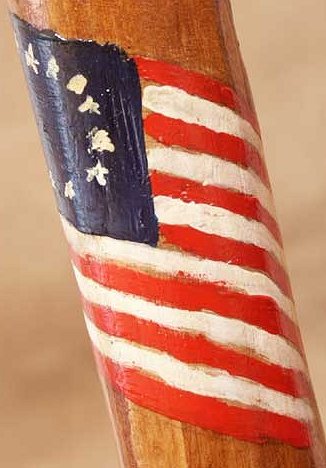
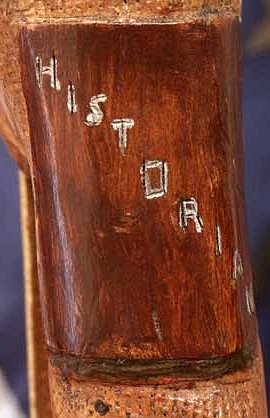
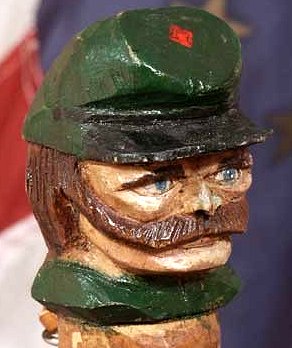
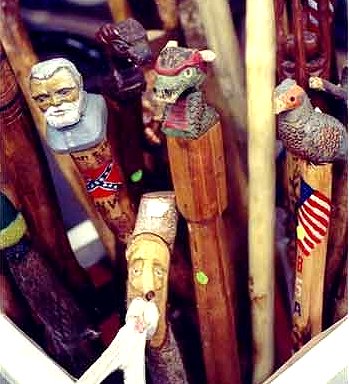
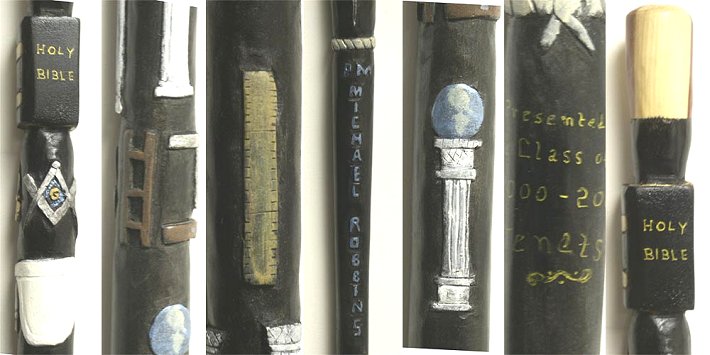
by Artisans of the Valley
Eric M. Saperstein
Gentleman’s fashion through
the 1800’s into the earlier third of the 20th century dictated the
requirement of a cane with any formal attire. Popularity soared
especially amongst veterans and members of fraternal organizations, such as
the Freemasons. Albert Stevens’s Cyclopedia of Fraternities (New York, 1907)
estimates that nearly 10 million, of the 76 million turn of the century US
population, were members of fraternal organizations. Presented to commemorate,
such as the Boston Post traditional presentation of a cane to the oldest
citizen of a town, carried as functional supports and means of defense, or
coveted as family heirlooms, canes have been part of American society for
several hundred years.
Not only are canes necessary
to ceremony and ritual, members express pride in their groups, military,
political, patriotic, religious, sister and brotherhoods, etc through personal
possessions. Canes, scepters, and staffs depicted events surrounding the
fraternity, many ornately decorated with insignias, symbolism, life events,
and badges of honor for the organization. The use of canes as fashion turned
towards bragging staffs, lovingly carved or inscribed with details of the life
of its bearer. The famous list of canes in the Phoenixmasonry Masonic Museum
each illustrate this tradition, providing insight into the life and history of
past Masons such as Robert E. Lee, who’s staff depicted the accomplishments of
his distinguished military career.
Artisans of the Valley is a
unique father and son company specializing in period furniture reproduction
and restoration, custom built-in woodworking, and unique sculptural folk art.
A wide spance of specialties, but these two eccentrics enjoy testing their
skills across the woodworking spectrum.
Master Craftsman Stan
Saperstein, the father, and founder of Artisans of the Valley, enjoys
whittling and folk art in his spare time. Now retired from the furniture side
of the business run by his son Eric, he has perfected his own unique variety
of traditional civil war era hand made walking staffs, creating a twist on a
nearly lost art form. Each stick is a signed one of a kind, offering an
individual the opportunity to choose their own personal statement by the staff
they carry. Through creativity and dedication, it is his desire to maintain
the tradition of cane carving, by offering his skills to members of fraternal
organizations to create unique and personal staffs fit to depict their lives.
Custom insignias can be
carved, whittled, sculpted, painted, or burned into the finished stick
including family trees, favorite designs, fraternity letters, business logos,
or other endless options. Stanley specializes in producing a walking stick
that contains as many personal distinctions as possible. Staffs are commonly
topped with a whittled sculpture. Options include, bear heads, eagles, and
wolves to the likeness of Lincoln, Lee, or Grant.
Collectors whom boast to have
one of Stanley's staffs in their possession include the famous author and
walking stick collector George H. Meyer, author of "American Folk Art Canes."
Around the country, the popularity of cane collecting is a growing hobby;
Forbes Magazine has recently reported a great art investment, American Folk
Art Canes. These pieces of 1800 – 1930 Americana have soared in value in the
past few years. This leap in value sparked a new interest in handmade canes,
both antique and new.
Stan Saperstein is a historian
and reenanctor, a member of the Sons of Union Civil War Veterans, a previous
officer and continuing member of the Camp Olden Round Table & Museum, he now
servers on the board of directors of the Swan Foundation, a group dedicated to
preserving the history of the American Revolution through education. Stan is
the last of the breed of formally trained Master Craftsman, approaching 30
years of experience in cabinetry, furniture design, joinery, & woodcarving.
Now retired, he enjoys his role as a mentor and teacher to his son Eric, the
new owner of Artisans of the Valley, assuring that a 400-year lineage of
craftsman reaches the next generation.
Custom wood canes are
available with anything the customer wishes on the cane. Most personalized
canes sell for around $125, with some custom works upwards of $300. Staffs or
canes can be shipped anywhere. The investment is very reasonable, considering
the current upswing in value of collectable crafts, and you will own a
conversation piece that never goes out of style. Please take a moment to visit
Artisans’ website to review Stanley’s canes, under Woodcarving & Sculpture,
as well as the other woodworking illustrated on their site. Artisans of the
Valley is available by commission to provide custom fraternal furniture, or to
provide restoration services on existing antique works.
More information is available
at
www.artisansofthevalley.com
Please feel
free to contact Stanley & Eric Saperstein at the following address:
Artisans of the Valley, LLC
103 Corrine Drive
Pennington, NJ 08534
(609) 737-9364
woodworkers@artisansofthevalley.com

